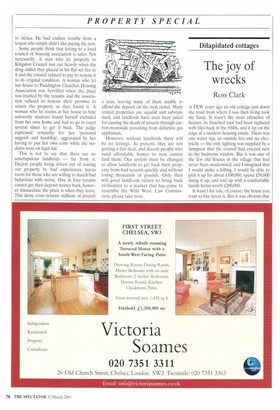The joy of wrecks
Ross Clark
A FEW years ago an old cottage just down the road from where I was then living took my fancy. It wasn't the most attractive of houses: its thatched roof had been replaced with tiles back in the 1940s, and it lay on the edge of a modern housing estate. There was one water tap, an outside loo and no electricity — the only lighting was supplied by a lamppost that the council had erected next to the bedroom window. But it was one of the few old houses in the village that had never been modernised, and I imagined that I would make a killing. I would be able to pick it up for about £100,000, spend £50,000 doing it up, and end up with a comfortable family home worth £200,000.
It wasn't for sale, of course; the house you want to buy never is. But it was obvious that at some point it would come on to the market; it was inhabited by a very elderly woman with bad legs, whose mediaeval lifestyle was rapidly catching up with her. I never knew why her front door was stopped up with chicken wire, until one day I saw a chicken poking its head out of the kitchen. Sooner or later social services would win her over and off she would go to some spanking new sheltered bungalow. To her credit, she thwarted them and stayed until the last.
When I heard that she had died, there came the delicate question: just how should one approach her family with an offer without appearing to be indecently hasty? I settled on two days after the funeral, when the tears would have been wiped away and there came the tedious business of turning to the paperwork. I rang up a neighbour and asked if he had a number for the deceased woman's daughter.
'I could give you the number,' came the reply. But be warned? she's getting a bit fed up. She's already had five or six people ringing up with offers, and it has upset her.' In fact, many hadn't even waited until her mother had died: during her last years the old woman had been persistently plagued by people wanting to know whether she was planning to sell up.
The same story, it transpires, is being repeated all over England: stubbornly independent old folk, living blameless lives in tumbledown cottages, are being preyed on by house-hunters besotted with the idea of saving a fallen building. Doorbells are being rung, notes are being pushed under doors, and I wouldn't be at all surprised if a few discreet phone calls were being made to social services in an attempt to winkle Out inconvenient occupants of promising restoration projects.
The property market has been buoyant over much of Britain for some years now, but no sector has been quite as excitable as the market for seemingly irreparable cottages. If you want to see madness, you should attend an auction of derelict cottages at a provincial inn. The grimmer the condition of a cottage, the more excitement it will arouse.
One Shropshire estate agent told me that his heart lifts when he sees brambles growing through a window: it adds thousands to the value of a place. People who are drunk on the endless home-improvement shows on television these days don't want a house in need of a little renovation; they want a complete wreck. One property he had sold was a long-forgotten, two-roomed shack with its roof fallen in and its front door accessible only down a steep, 400-yard slope; yet 70 bidders at the auction had rapidly driven the price to £47,500. A cottage whose entire roof had become detached from its mountings and was in danger of sliding into the neighbour's garden fetched £40,000, with no regard as to the potential liability should the neighbour be decapitated.
An isolated two-bedroom farmhouse sold for £250,000, in spite of needing £100,000 of structural work. Were it to be sold again once renovation was complete, the owner would make a loss. You no longer make a profit from doing up a wrecked building; you pay for the privilege.
It is a simple equation of supply and demand: over the past generation, so many old farmworkers' cottages have been turned into smart little country pads for the middle classes that there are hardly any left in their original condition. There ought to have been more, but many were burnt at the dead of night by landowners after the last war in order to reduce their liability for domestic rates. At the time, a redundant farm cottage was a burden: they were not to know that they were torching their pension plans.
The wonder is that there are any dilapidated cottages left at all, and that the countryside has not become like Germany's, where a Mercedes stands outside every door and there is never a strand of thatch out of place. Yet just as the Japanese in 1975 discovered a mid-Pacific island that was quite unaware that the second world war had ended, there seems always to be one more wretch, still drawing water from a well, still going outside at night to pee in the snow for want of an indoor lavatory, quite oblivious of the fact that his cottage is worth a couple of hundred thousand — enough to put him up at the Ritz for the remainder of his life.
I can't help feeling that it will be a tremendous loss when the last earth-closet vanishes from rural England. You wonder why, when the heritage police are listing historic buildings, they can't list one or two of the occupants as well.



























































































 Previous page
Previous page